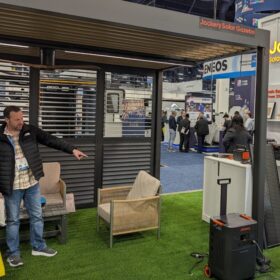Solar Energy Industries Association (SEIA) has long engaged in lobbying, and its track record shows a number of substantial wins, including getting an extension of the federal Investment Tax Credit (ITC) in 2015. And according to an analysis by Reuters, the organization’s political action committee (PAC) began providing more money to Republican candidates than Democrats in 2016, in contrast to previous years.
This was the last year that SEIA was led by Rhone Resch. Under new President and CEO Abigail Ross Hopper, the organization has substantially increased its funding of Republicans – a timeline which corresponds with the administration of President Donald Trump.
Reuters states that SEIA’s PAC has contributed more than twice as much to Republicans as to Democrats in the current campaign cycle, at $56,500 versus $26,700.
“In general, we gave money to people who are in a position to help us with our policy priorities,” Hopper told pv magazine. “More and more solar projects are getting built in red districts, and solar is truly a bipartisan source of energy.”
“Given the growing interest in solar in Republican strongholds and the fact that Republicans control the House, Senate and White House, we felt we struck the right balance with our limited PAC budget.”
SEIA has been clear that PAC funds do not come from either its trade show revenue or member dues – which together totaled slightly less than $11 million in 2016.
However, at least some of the funds are donated by its executives. As of SEIA’s 2016 990 filing the organization’s top six executives were compensated with a combined $2.4 million, and these executives are paid from revenues which include member dues and trade show revenue.
This includes revenue from the Solar Power International Trade Show, which is jointly sponsored by SEIA and the Smart Electric Power Association (SEPA).
“Friends on both sides”
Reuters notes this number as part of a larger trend of political action committees representing solar and wind companies shifting their donations and providing more money to Republican candidates than Democrats, a switch that occurred in 2016.
However, the portion that SEIA gives to Republicans is higher than the average for wind and solar PACs, or that of campaign contributions by the American Wind Energy Association (AWEA). This is despite the strong wind potential and thus wind industry presence in so-called “red” states in the Plains States and Mountain West.
Solar is also growing in red states, particularly in the U.S. South. However, other than “purple” North Carolina the states with the largest solar markets are often “blue”, particularly California and Massachusetts.
SEIA has always emphasized that it has friends “on both sides of the aisle” – a phrase that has been echoed verbatim by SEIA’s public relations for at least seven years.
However, the actions of Congressional Republicans have not been friendly to solar and wind writ large. While there has been little comprehensive energy legislation affecting solar and wind over the last few years, the tax reform process threatened to mute the monetization of the Investment Tax Credit (ITC) through the creation of the Base Erosion Anti-abuse Tax (BEAT) provision, a threat which was mostly mitigated by a last-minute change.
Tax reform did introduce substantial additional complexity to tax equity finance, however not all of the changes have been negative for solar companies.
Additionally, a bill proposed by Republican Congressman Tim Walberg from Michigan attempted to gut the Public Utilities Regulatory Policy Act of 1978 (PURPA), which has been an important driver of utility-scale solar markets in multiple states including North Carolina, South Carolina, Utah and Oregon. This bill received five Republican co-sponsors.
Correction: This article was corrected at 12:12 PM EST on May 2. An earlier version of this article stated that SEIA was paying for political action through member dues and trade show revenue. This was incorrect and has been changed. We regret the error.
This content is protected by copyright and may not be reused. If you want to cooperate with us and would like to reuse some of our content, please contact: editors@pv-magazine.com.









Only thing I can think of is that most Democrats are already “believers” in RE. And, it seems there are a lot of politicians that can become believers in whatever as long as you donate to them.
This sounds to me that instead of donating to the campaigns of like-minded politicians, SEIA is attempting to buy support from people already elected. Am I naive? I would think that it would be a better strategy to get good policy makers in place and not just buy-off the people there. I guess I don’t get it.
This is a common strategy. A lot of labor unions do the same thing: instead of supporting candidates more favorable to their interests, they try to gain favor and access with the already powerful. I believe that this is at best short-term thinking, and undermines their interests in the medium- to long-term.
I am not the least bit surprised that SEIA is following this strategy. It aligns with their orientation and track record as an organization, and appears to also align with the inclinations of many of their top executives.